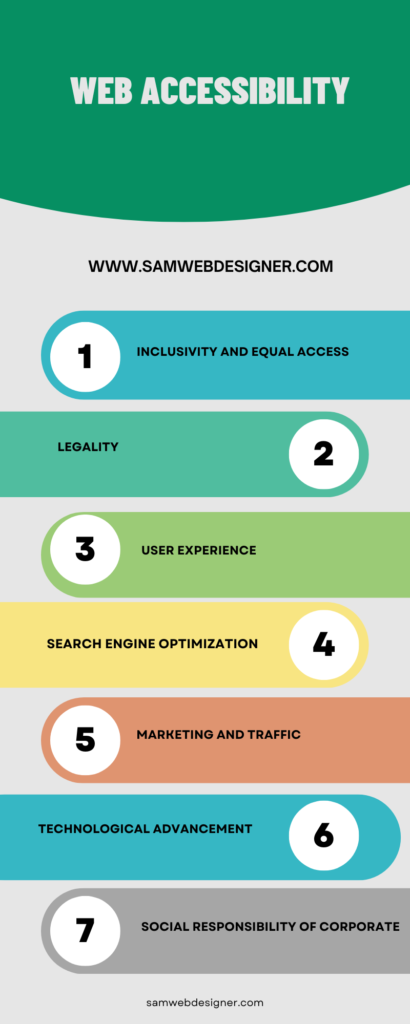When a website is designed, it is coded so that the public with a vast spectrum of hearing, movement, sight, and cognitive abilities can access and interact with it without problem, this feature of a website is known as web accessibility.
In simple terms, web accessibility is the development of websites with elements that make a site uncomplicated to understand, perceive, navigate, and interact with people with disabilities.
Five Principles Considered While Designing Website with Web Accessibility.
1. Perceivable
Whenever a user is accessing the content, there should be an alternative module for text content, like images and videos.
This makes it easier for visitors to navigate the website and ensures that the information presented is clear.
2. Operable
Make the functions of the website accessible through simple devices like a keyboard. So it is easily operated by people with disability.
Avoid contents that could trigger any kind of physical discomfort or seizure. Provide enough time for users to read and complete tasks if present on the website.
3. Understandable
The content and texts should be readable and understandable. The design should consist of
predictable navigations and functionality that helps users avoid mistakes and help them walk through the website.
4. Robust
Websites are required to maximize their compatibility with the help of assistive technologies.
Why is web accessibility important in modern websites?
Here are some significances of web accessibility in today’s digital landscape.

1. Inclusivity and Equal Access
Having rib accessibility makes sure that users with a disability can equally access and interact with a website as other people.
This idea of inclusivity also aligns the website with the principle of equal rights and opportunities for individuals, regardless of their ability.
2. Legality
There are laws enacted and regulated to maintain and mandate web accessibility in male countries and for reasons.
If your website is not compliant with the legal requirements for specific reasons you may have to be here legal consequences that might include fines and lawsuits.
3. User Experience
With web accessibility, users often have a better experience of the website.
People other than those with disabilities are also more responsive, as the design is more user-friendly, navigable, and responsive. There is positive interaction with each user visiting the website.
Users will also have a positive mindset towards the website as web accessibility makes a website inclusive.
4. Search engine optimization
Providing descriptive texts and images is helpful not just for the visually impaired, but also enhances the search engine ranking as the content on the website is easier to understand.
This kind of practice can also align with standard SEO practices, which further prioritize your content as accessible and user-friendly in the search engines.
5. Marketing and Traffic
With the help of accessibility, businesses and organizations can widen their audience and reach out to a more diverse user base.
It includes people with different abilities to tap into the web visitor statistics as people with disability represent a significant portion of people using the internet.
6. Technological Advancement
As the internet is getting revolutionized, technologies are rapidly developing, and people can access the web through various devices and platforms.
With web accessibility, websites can be made compatible, and different assistive technologies can be included so that individuals can use the device without extra attention and time.
7. Social Responsibility of Corporate
Having web accessibility on a website helps in the demonstration of corporate social responsibility as it shows priorities and reflects the organization’s commitment to social values, ethics, practices, and consideration of an individual not just as a source of income but also as a person.
Conclusion
In conclusion, web accessibility is the cornerstone of an inclusive online environment. By adhering to principles like permeability, operability, understandability, and robustness, websites become user-friendly for everyone, especially those with disabilities.
The significance of web accessibility extends to inclusivity, legal compliance, enhanced user experiences, improved search engine optimization, broader marketing reach, adaptation to technological advancements, and the demonstration of corporate social responsibility.
Embracing web accessibility not only ensures equal access but also reflects a commitment to ethical practices and values, recognizing individuals not just as users but as valued members of the online community. It’s a vital step towards a more accessible and compassionate digital landscape.

